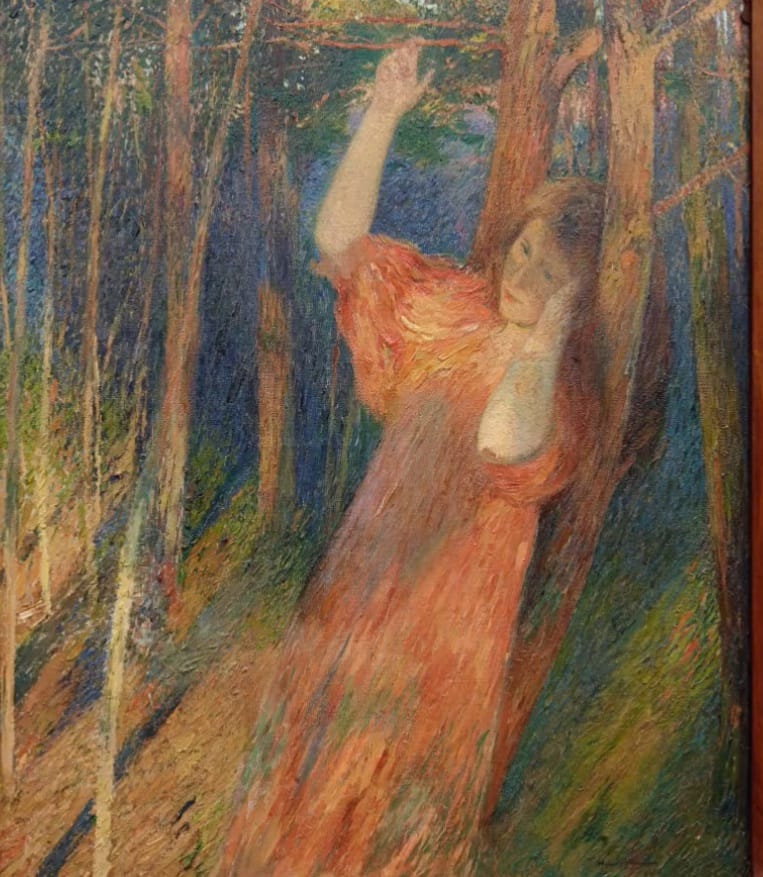meditation 49


Wheresoever
your mind
rests
in peace . . .
let it
remain
there . . .
Bliss prevails . . .
▼▼⛛▼⛛▼▼
Notes:
Swami Lakshmanjoo insists on the universality of the scripture's teachings. And this verse is one of the most generously universal. Wheresoever, after all, is all embracing.
The word includes locales far afield from those of medieval Kashmir, and all moments, past and future, within the present.
The countless wheresoevers Lake Poet William Wordsworth put on the map led to a luminous, tranquil transcendent realm, a kind of terra incognita which, beckoning from within, is recognized as our own soul.
As the literary critics Harold Bloom and Lionel Trilling wrote, "Before Wordsworth, [English] poetry had a subject. After Wordsworth, its prevalent subject was the poet's own subjectivity – and so a new poetry was born."
Although William was certainly unaware of the Vijñāna Bhairava, its verse speaks to the very core of the English poet's spiritual and aesthetic heart: his responses to the sounds of streams and waterfalls, to all-enveloping darkness, to the alluring spaciousness of clear blue sky, to the devout stilling of human breath.
It was Wordsworth who penned a poem which – for its contemplative tone and content – was to become famous as far afield as India.
The poem celebrates what happens when awareness dwells upon his recollections of a particular locale, a wheresoever where he becomes absorbed in profound peace.
Many centuries ago, it was Kashmir's great yogi and philosopher Abhinavagupta who cleared the path for Wordsworth's home in Indian hearts and minds. He did so by stating that the underlying essence (rasa) of aesthetic experience is Shanta Rasa: the rasa of tranquility, the silent bed of awareness upon which the comic, the tragic, the heroic, the erotic, and all the other rasas play their roles.
Artists and connoisseurs whose hearts remain afloat in this rasa of tranquil awareness are said to be of the same heart (sahṛdaya).
Although some Indian professors of English Literature once felt that Wordsworth must have been Hindu or was at least directly influenced by Hindu thought in his writings about immorality, there is little evidence to that effect.
Wordsworth did, however, in addition to rhapsodizing about immortality, define poetry in rather Abhinavagupta-esque terms: as "emotion recollected in tranquility."

In India, Wordsworth's poem "Lines Written a Few Miles above Tintern Abbey" is thought to poetically embody transcendence as quietly as a yogi in breathless repose.

Five years have passed; five summers, with the length
Of five long winters! and again I hear
These waters, rolling from their mountain-springs
With a soft inland murmur. –Once again
Do I behold these steep and lofty cliffs,
That on a wild secluded scene impress
Thoughts of more deep seclusion; and connect
The landscape with the quiet of the sky.
The day is come when I again repose
Here, under this dark sycamore, and view
These plots of cottage-ground, these orchard-tufts,
Which at this season, with their unripe fruits,
Are clad in one green hue, and lost themselves
'Mid groves and copses. Once again I see
These hedge-rows, hardly hedge-rows, little lines
Of sportive wood run wild: these pastoral farms,
Green to the very door; and wreaths of smoke
Sent up, in silence, from among the trees!
With some uncertain notice, as might seem
Of vagrant dwellers in the houseless woods,
Or of some Hermit's cave, where by his fire
The Hermit sits alone.
These beauteous forms,
Through a long absence, have not been to me
As is a landscape to a blind man's eye:
But oft, in lonely rooms, and 'mid the din
Of towns and cities, I have owed to them,
In hours of weariness, sensations sweet,
Felt in the blood, and felt along the heart;
And passing even into my purer mind
With tranquil restoration: – feelings too
Of unremembered pleasure: such, perhaps,
As have no slight or trivial influence
On that best portion of a good man's life,
His little, nameless, unremembered, acts
Of kindness and of love. Nor less, I trust,
To them I may have owed another gift,
Of aspect more sublime; that blessed mood,
In which the burthen of the mystery,
In which the heavy and the weary weight
Of all this unintelligible world,
Is lightened: –that serene and blessed mood,
In which the affections gently lead us on, –
Until, the breath of this corporeal frame
And even the motion of our human blood
Almost suspended, we are laid asleep
In body, and become a living soul:
While with an eye made quiet by the power
Of harmony, and the deep power of joy,
We see into the life of things. . . .


In Great Britain, within the woodlands of estate landscapes strewn with boulders, dense clumps of uprooted trees, and moldy, crumbling cottages, English hermits often hid away.
These gardens, however, were not dismissed as wastelands devoid of any sense of compositional logic. In their storm-ravaged, dark recesses, they gave testament to a sense of the Romantic Sublime or to an introspective form of melancholy lending a certain Byronic allure.
These unfrequented haunts, grottoes, and sun-deprived glades offered not only darkness but also niches for a sagacious sense of solitude.
Many estate owners, however, built hermitages only to discover that they themselves were neither particularly contemplative nor sagacious.

The obvious answer was to lure an ornamental hermit to hallow such hollows. It is easy for readers to see how, in myriad English and Indian hearts, Wordsworth became the hermit of choice.



Wherever you find peace . . .
Notes.
In The Manual of Self-Realization, Swami Lakshmanjoo comments on the verse as follows: Wherever your mind becomes peaceful, wherever your mind is situated peacefully, put your mind there.
Swami Lakshmanjoo and Pandit Dina Nath Muju's translation appears below:
Verse 74
Wherever (towards any object or idea) the mind moves (outwardly or inwardly) God Consciousness is there, at that point. The absence of God Consciousness cannot be.